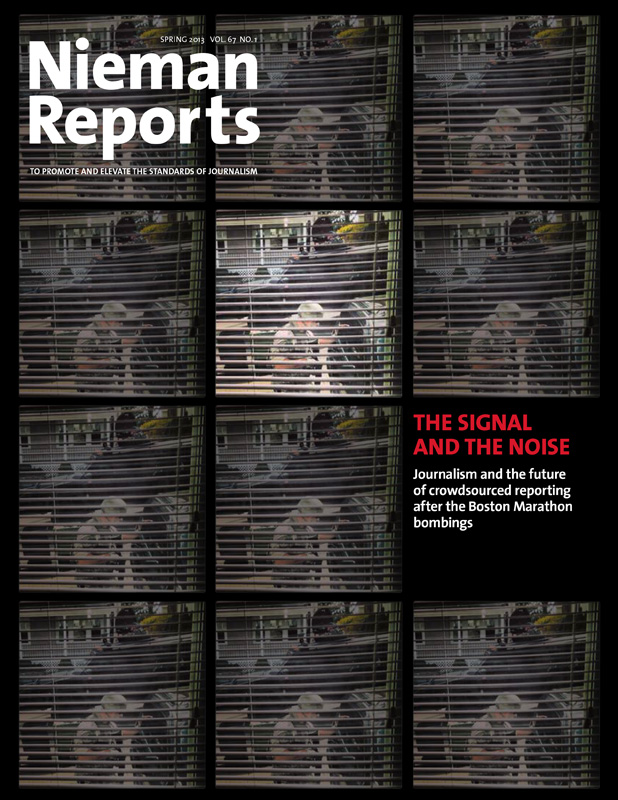
The Signal and the Noise
One tweeter boasted of a "game-changing victory" for crowdsourcing in the early hours of the Boston area manhunt. But what began as a low-grade fever on social media spiked with the wrongful naming of a bombing suspect. All the while, Nieman Visiting Fellow Hong Qu was testing his new tool Keepr as a screen for credibility and posting early results on Nieman Reports as the story unfolded. Qu and journalist Seth Mnookin, who tweeted live from the manhunt, write about how smartphones and their unprecedented power to publish require new journalistic tools and practices, while other Nieman Fellows consider the intersection of social media and journalism in the aftermath of the attac

Photo by Eden Brackstone
I am not a journalist. I’m a digital guy. I am well versed in the trends of newspapers’ decline, but at the age of 35 I’ve never read a daily newspaper. My entire information life has been digital and, consequently, fragmented.
It was hard for me to get too worked up about the end of big newspapers. But then a funny thing happened. I was asked to judge a big journalism prize. As part of the judging, I read more than 200 investigative news stories from outlets big and small, although almost all of them newspapers. They were stories of terrible depravity and corruption, in some sense the worst humanity has to offer. But I finally understood in a tangible way the crucial role newspapers play in a democracy—and I began to get afraid, very afraid.
The Internet and mobile phones—a combination I call “radical connectivity”—profoundly empower individuals in ways that spell disaster for traditional “big” organizations. Big news organizations have seen both news production and advertising revenue disrupted by radical connectivity. The entertainment industry, from publishing to record companies, is in its own death throes. Big armies face distributed cells of terrorists instead of nation-states, while ad-hoc hackers the world over look for disruptive opportunities for “lulz.” Big political parties find themselves besieged by insurgents like Tea Party candidates, while citizens crowdsource solutions to public problems outside of big government. Tenured professors at big universities are growing large audiences on YouTube outside of tuition-paying students. Even big manufacturing faces a growing challenge from desktop 3-D printers, spelling an end for big brands.
An epochal change is under way that will spare none of our large institutions and along the way is creating some new, “even bigger” entities; namely, the six companies that control our online lives: Amazon, Apple, eBay, Facebook, Google, and Microsoft (owner of Skype).
We can feel the ground shifting under our feet, and we must not be afraid, but instead imagine (and build!) a more compelling future. The challenge of the future of journalism in particular is how to build new institutions for investigative journalism and holding power accountable that are able to take advantage of the profound individualism of radical connectivity. This requires rethinking the business models and the production models for news.
It is no secret that the state of the news industry is grim. Each month brings word of more newspapers closing or cutting back and fewer and fewer jobs in journalism being created at the biggest news organizations. At the same time, there are more and more exciting experiments in the future of journalism, from a myriad of Kickstarter crowdfunded projects to a bounty of new start-ups entering the space. We’re experiencing a diaspora of journalism. With the end of the newspaper era, news is migrating to all kinds of places, some of them unusual and unexpected, and all of them small. Gone are the days when a job as a cub reporter in a city paper was the start of a promising career in journalism.
I’m not about to defend the business models of newspapers. Advertising looks like a temporary 50-year aberration. For a few decades, mass advertising commanded a price premium because of the exclusivity of its reach and the opacity of its effectiveness. But the digital revolution came along, and suddenly you could figure out exactly how effective your advertising was, and the exclusivity of all media was dramatically democratized.
The future of news is necessarily small, at least in terms of building compelling business models. Years ago, Kevin Kelly hypothesized about the “1,000 true fans” theory. The future of music, he suggested, was that a musician would have 1,000 “true” fans, each willing to pay $100 a year to support that musician’s work. The 1,000 true fans theory is a good example of a business model that takes advantage of radical connectivity’s fundamental architecture of the individual.
David Weinberger once described the Internet as “small pieces loosely joined.” That’s a pretty good way to describe the future of news. A single blogger-reporter can build a substantial following online, strong enough to manage a range of revenue streams—advertising, “tip” jars, paid content subscriptions, merchandise (from books to T-shirts), speaking fees, short self-published e-books, and more. Lest you think this model isn’t achievable, plenty of people are using it with significant financial success, from Joshua Marshall’s Talking Points Memo to one of the most trafficked blogs online, BoingBoing.net.
Imagining and building new organizations is challenging yet hardly impossible. In recent years, a crop of online-only outlets have emerged that deliver political and government news that has otherwise been pruned from traditional media. The Texas Tribune and Homicide Watch D.C. are (very different) start-ups in the space. But they are both making an exciting, compelling go at re-imagining both the business models and the production methods of journalism. And so far, they are succeeding.
Some may cringe, but there is also a growing group of players who represent another part of the future of journalism, but from outside the hallowed halls of journalism schools and traditional career paths. In fact, many of them take approaches considered anathema. Outlets like Vice, BuzzFeed, and NSFWCorp (Not Safe For Work Corporation) are increasingly odd amalgams of meme-making viral material next to genuinely compelling reporting. Vice recently ran the following pieces side by side: “The Gay Sex Club Next to the Vatican Is the Saddest Place on Earth,” “Is It Wrong to Celebrate Thatcher’s Death?”, “Yemen’s Deposed President Has Built a Museum Dedicated to Himself,” and “No Justice No Trees,” an account of environmental and tribal activism and corporate abuse of power in a fight deep in the Brazilian rainforest.
Across all of the exciting examples of emerging news organizations, scale remains elusive. Smaller journalism outlets with fewer journalists (but with mainstream reach and modestly profitable business models) ultimately offer an unsatisfying, incomplete future. The real challenge is what gets lost in the transition from institutional news to new, more individual-focused models for the news: investigative reporting. The challenge is that holding power accountable may have the most civic value, but it tends not to have a corresponding financial value. The era of using sports and entertainment news to subsidize investigative reporting has evaporated. How do we pay for big, expensive, high-risk investigative reporting?
There isn’t a good answer—yet. ProPublica’s nonprofit, foundation-funded investigative approach is one piece of the puzzle. So is The Texas Tribune’s database journalism. The Guardian is piloting another part of the solution, using the “former audience” (a term columnist and blogger Dan Gillmor coined to describe how in the age of radical connectivity audiences engage online) to help sift through large volumes of information as part of ongoing investigations. Random acts of citizen journalism occasionally make appearances in the investigative sector. Lately, Kickstarter (among other crowdfunding platforms) has emerged as a vehicle for some impressive investigative work, like the recent Matter story on cyber-scammers targeting America’s poorest people. But the truth is there still isn’t enough investigative journalism happening outside of newspapers to come anywhere near the (shrinking) volume provided by newspapers in the past.
The institutions of big news in this country emerged over the course of more than a century, fostering a culture that rewards journalism at its best through institutions like the Pulitzer Prize. But there is no Pulitzer Prize for Investigative Reporting by a Blogger. We need to build new ways of encouraging investigative journalism outside of existing institutions. Part of the answer lies in the ”even bigger” giants of the digital age. Whether we like it or not (and whether they like it or not), Google, Apple, Facebook and Amazon are dramatically shaping the future of news. It is dangerous to leave them out of the equation when talking about journalism. At a minimum, we need a conversation about what role they play and whether they have obligations to the public sphere.
When we think about what gets lost in the end of big (beyond a lot of jobs), what worries me most is the loss of investigative journalism—holding power accountable—and the loss of a broad public sphere. The front page of a newspaper was a judgment about what was important to the public, what we should think about, what we should discuss. But now, the unbundling of content has led to the unbundling of audience. The “even bigger” digital platforms exacerbate the problem through personalization, ensuring that my Google search turns up different results from my wife’s. There is no shared public experience.
The power to shape the public sphere now belongs to leaders other than newspaper editors, but newspapers have had an important and unique role in shaping the country. There is an opportunity for the “even bigger” digital platforms to take more of a role in creating the public sphere. For example, in the week following the Boston Marathon bombings, Twitter might have anointed a few key Twitter accounts as authoritative sources to follow: the Boston Police, for example, and the FBI’s Boston office. As it was, it got hard to distinguish the actual MBTA, the public transport authority in Boston, from MBTAinfo, an active tweeter who is unaffiliated with the institution.
The more puzzling question is how to encourage investigative journalism. Publicly funded approaches like the BBC and foundation-funded outfits like ProPublica are part of the solution. Investigative journalism requires time, which generally requires money. Author and columnist Paul Carr recently described “the hilariously high travel costs required for serious reporting” in citing the challenges he faces building a news operation. Holding power accountable frequently incurs the wrath of the powerful, so some legal muster to marshal resources against threats of intimidation is essential. All of this doesn’t necessarily require a giant organization, but it does require more than 1,000 true fans. The lone blogger taking on, say, the tobacco industry (or, dare I say it, the tech industry) is going to face some massive hurdles.
As a range of institutions struggle to make sense of the individual empowerment of the digital age, and as a crop of new organizations are birthed, we need to keep our eye on encouraging, inspiring and funding investigative journalism. As authority gets shuffled out of traditional credentialing institutions and dealt to others, we may find investigative journalism living in some unusual places—academia, for example, or entertainment companies, or even (as much as it may turn the stomachs of some) industry associations. We might also demand that our old institutions invest in high-risk start-ups that might, just might, have the potential to bring new resources to investigative journalism, however strange the vehicles may appear.
This is an exciting time to be a journalist. Opportunities abound; start-ups proliferate by the day. The future won’t look like the past. It won’t be the same, and it’s up to us to make sure that there is continuity in the core values of the profession as it is transformed. There are new institutions to be built that aspire to provide what we love most about journalism: the news.
 Nicco Mele, author of “The End of Big: How the Internet Makes David the New Goliath,” is a lecturer at Harvard Kennedy School.
Nicco Mele, author of “The End of Big: How the Internet Makes David the New Goliath,” is a lecturer at Harvard Kennedy School.









